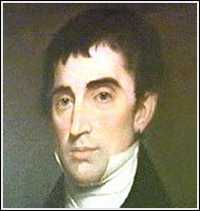A Biography of John Lansing Jr. 1754-1829
 On January 30, 1754, John Lansing was born in Albany, NY, to Gerrit Jacob and Jannetje
Lansing. At age 21 Lansing had completed his study of the law and was admitted to practice. In
1781 he married Cornelia Ray. They had 10 children, 5 of whom died in infancy. Lansing was
quite wealthy; he owned a large estate at Lansingburg and had a lucrative law practice.
On January 30, 1754, John Lansing was born in Albany, NY, to Gerrit Jacob and Jannetje
Lansing. At age 21 Lansing had completed his study of the law and was admitted to practice. In
1781 he married Cornelia Ray. They had 10 children, 5 of whom died in infancy. Lansing was
quite wealthy; he owned a large estate at Lansingburg and had a lucrative law practice.
From 1776 to 1777 Lansing acted as military secretary to Gen. Philip Schuyler. From the military world Lansing turned to the political and served six terms in the New York Assembly--1780-84, 1786, and 1788. During the last two terms he was speaker of the assembly. In the 2-year gap between his first four terms in the assembly and the fifth, Lansing sat in the Confederation Congress. He rounded out his public service by serving as Albany's mayor between 1786 and 1790.
Lansing went to Philadelphia as part of the New York delegation to the Constitutional Convention. As the convention progressed, Lansing became disillusioned because he believed it was exceeding its instructions. Lansing believed the delegates had gathered together simply to amend the Articles of Confederation and was dismayed at the movement to write an entirely new constitution. After 6 weeks, John Lansing and fellow New York delegate Robert Yates left the convention and explained their departure in a joint letter to New York Governor George Clinton. They stated that they opposed any system that would consolidate the United States into one government, and they had understood that the convention would not consider any such consolidation. Furthermore, warned Lansing and Yates, the kind of government recommended by the convention could not "afford that security to equal and permanent liberty which we wished to make an invariable object of our pursuit." In 1788, as a member of the New York ratifying convention, Lansing again vigorously opposed the Constitution.
Under the new federal government Lansing pursued a long judicial career. In 1790 he began an 11-year term on the supreme court of New York; from 1798 until 1801 he served as its chief justice. Between 1801 and 1814 Lansing was chancellor of the state. Retirement from that post did not slow him down; in 1817 he accepted an appointment as a regent of the University of the State of New York.
Lansing's death was the most mysterious of all the delegates to the Constitutional Convention. While on a visit to New York City in 1829, he left his hotel to post some letters. No trace of him was ever found, and it was supposed that he had been murdered.
